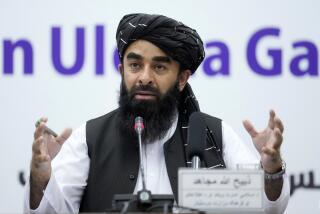Afghan President Ashraf Ghani in Pakistan to repair ties
- Share via
Reporting from Islamabad, Pakistan — Afghan President Ashraf Ghani arrived in Pakistan on Friday for a two-day visit aimed at mending the countries’ strained ties and reviving chances for peace talks with Taliban insurgents.
Ghani’s first state visit to Pakistan since taking office in September follows trips to China and Saudi Arabia in what Afghan diplomats have described as a multilateral effort to raise pressure on the Taliban to end 13 years of fighting.
The road to peace negotiations almost certainly winds through Pakistan, whose ungoverned northern tribal areas are a sanctuary for the Afghan Taliban. Under former President Hamid Karzai, Afghanistan regularly accused Pakistan’s security establishment of supporting the Taliban leadership based on the other side of the countries’ porous, 1,600-mile border.
Pakistan in turn has accused Afghanistan of failing to police the border and allowing in insurgents who seek to overthrow the government in Islamabad. The relationship has further soured over Afghanistan’s refusal to recognize the Durand Line, the 19th century British-drawn boundary, as the countries’ official border.
Both sides see Ghani’s election and the formation of a national unity government in Afghanistan as a chance to refresh the relationship. Pakistani officials were said to be pleased that Ghani, an economist and former World Bank official, prevailed over election rival Abdullah Abdullah, who is seen as being closer to Pakistan’s archenemy, India.
“The recent developments in Afghanistan offer a unique opportunity to transform the bilateral ties and to build a strong and forward-looking relationship,” said Pakistani foreign ministry spokeswoman Tasnim Aslam.
The visit comes as Pakistan’s military appears to be reasserting control over the country’s foreign policy, particularly on Afghanistan, following popular protests that have weakened Prime Minister Nawaz Sharif. A series of Pakistani officials visited Kabul in recent weeks, including the army chief, Gen. Raheel Sharif, and Lt. Gen. Rizwan Akhtar, the new head of the Inter-Services Intelligence directorate, the powerful military spy agency.
Arriving at the military headquarters in Rawalpindi on Friday, Ghani was greeted by an army honor guard and received a security briefing, officials said. In the meeting, Ghani praised “Pakistan’s efforts to fight terrorism” and pledged to boost security cooperation, including training and border policing, according to a Pakistani military press release.
In Kabul, Ghani’s office issued a statement saying the countries had agreed to double bilateral trade, which now stands at $2.5 billion annually, within two years
“There are high expectations for the visit on both sides,” said Hasan Khan, a security expert in Islamabad. “The recent visits of senior Pakistani officials, including the army chief, have given Kabul a lot of reassurance.”
Afghan officials say that Ghani’s recent visits to Saudi Arabia and China – two major allies of Pakistan – marked an attempt to raise pressure on Islamabad to help restart Taliban peace talks. China has indicated a willingness for the first time to help mediate talks, partly, analysts believe, because it is worried that the withdrawal of most U.S. and international troops from Afghanistan at the end of the year will create a security vacuum that could be exploited by ethnic Uighur militants.
The United States unsuccessfully tried for years to open negotiations between Kabul and Taliban representatives in the Gulf state of Qatar. Some Afghan officials believe that Beijing is better positioned to facilitate talks because of its close security relationship with Islamabad.
“China could play a positive role,” said Said T. Jawad, a former Afghan ambassador to Washington. “China and Pakistan have many mutual interests.”
But the diplomatic effort also carries risks for Ghani. Many Afghans are deeply distrustful of Pakistan, believing it wants to control Kabul’s foreign policy. The increased outreach to Pakistan and China also could alienate India, a major investor and one of the countries whose security cooperation and military training Afghanistan is counting on as Western troops pull back.
“President Ghani has to explain to India what this new approach is all about,” Jawad said.
Special correspondent Sahi reported from Islamabad and Times staff writer Bengali from Kabul, Afghanistan.
For more news from South Asia, follow @SBengali on Twitter
More to Read
Sign up for Essential California
The most important California stories and recommendations in your inbox every morning.
You may occasionally receive promotional content from the Los Angeles Times.














